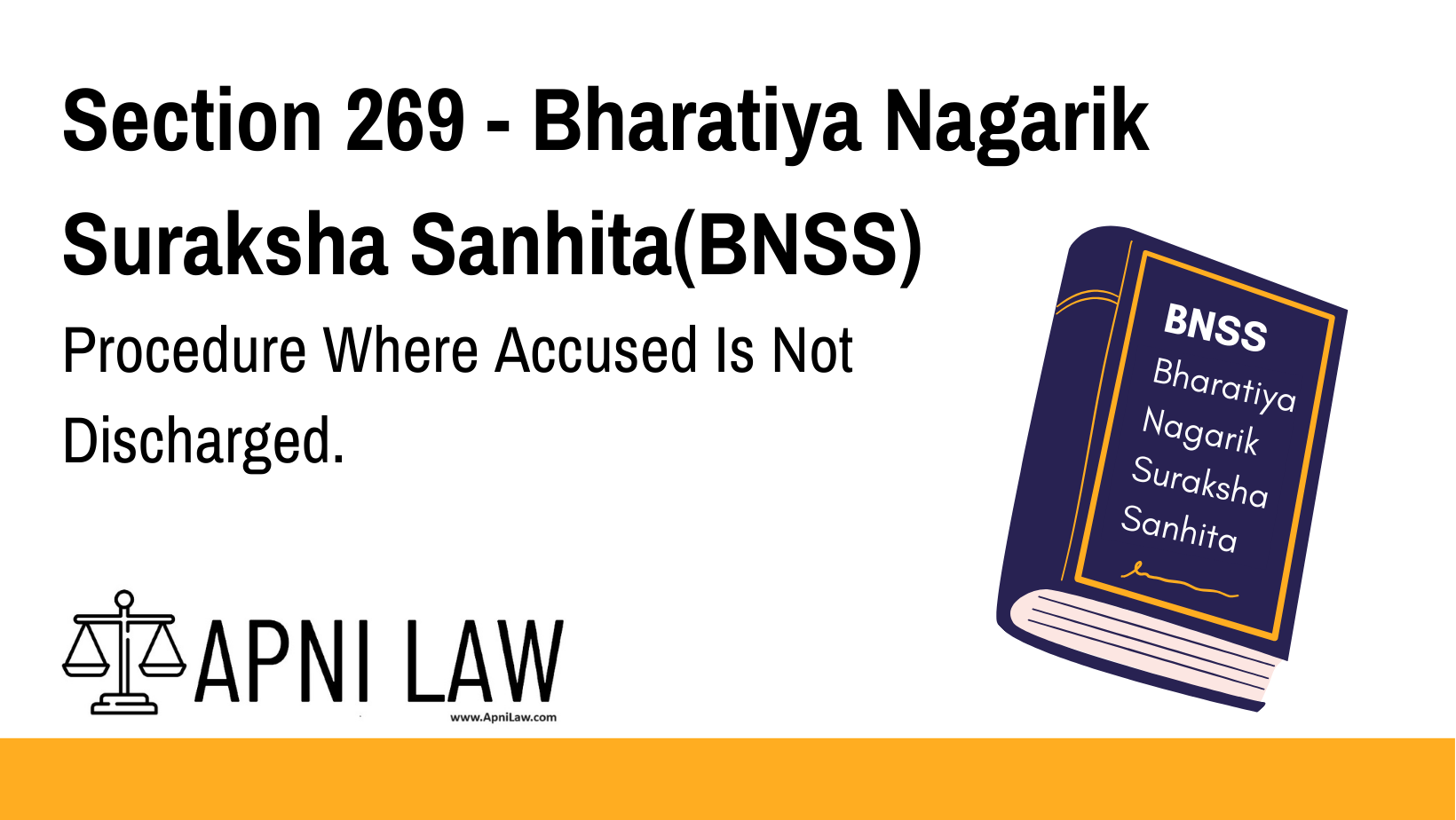Code: Section 269 BNSS
269.
(1) If, when such evidence has been taken, or at any previous stage of the case, the Magistrate is of opinion that there is ground for presuming that the accused has committed an offence triable under this Chapter, which such Magistrate is competent to try and which, in his opinion, could be adequately punished by him, he shall frame in writing a charge against the accused.
(2) The charge shall then be read and explained to the accused, and he shall be asked whether he pleads guilty or has any defence to make.
(3) If the accused pleads guilty, the Magistrate shall record the plea, and may, in his discretion, convict him thereon.
(4) If the accused refuses to plead, or does not plead or claims to be tried or if the accused is not convicted under sub-section (3), he shall be required to state, at the commencement of the next hearing of the case, or, if the Magistrate for reasons to be recorded in writing so thinks fit, forthwith, whether he wishes to cross-examine any, and, if so, which, of the witnesses for the prosecution whose evidence has been taken.
(5) If he says he does so wish, the witnesses named by him shall be recalled and, after cross-examination and re-examination (if any), they shall be discharged.
(6) The evidence of any remaining witnesses for the prosecution shall next be taken, and after cross-examination and re-examination (if any), they shall also be discharged.
(7) Where, despite giving opportunity to the prosecution and after taking all reasonable measures under this Sanhita, if the attendance of the prosecution witnesses under sub-sections (5) and (6) cannot be secured for cross examination, it shall be deemed that such witness has not been examined for not being available, and the Magistrate may close the prosecution evidence for reasons to be recorded in writing and proceed with the case on the basis of the materials on record.
Explanation of Section 269 BNSS
Section 269 of the Bharatiya Nyaya Sanhita (BNSS) outlines the procedure a Magistrate must follow when framing charges against the accused and handling evidence in the case. It ensures that the accused is informed of the charges, given an opportunity to plead guilty, and allowed to participate in the examination of witnesses.
Key Provisions:
-
Framing of Charges (Sub-section 1):
If, at any stage of the trial, the Magistrate believes there is sufficient evidence to presume that the accused has committed an offence, they will frame a charge against the accused in writing. This is done if the Magistrate has the competence to try the case and can adequately punish the accused. -
Reading and Explaining the Charge (Sub-section 2):
Once the charge is framed, it is read and explained to the accused. The accused is then asked whether they plead guilty or have any defence to present. -
Plea of Guilty (Sub-section 3):
If the accused pleads guilty, the Magistrate may, at their discretion, convict the accused based on the guilty plea and record the plea accordingly. -
Refusal to Plead or Request for Trial (Sub-section 4):
If the accused refuses to plead or claims to be tried, the Magistrate will ask them whether they wish to cross-examine any of the prosecution’s witnesses. This is typically done at the next hearing, or in urgent cases, the same day. -
Cross-Examination and Evidence (Sub-sections 5 & 6):
If the accused wishes to cross-examine any of the prosecution’s witnesses, those witnesses will be recalled for cross-examination. The process of re-examination follows if needed. Afterward, the witnesses are discharged. The remaining prosecution witnesses will be examined in the same manner. -
Closure of Prosecution Evidence (Sub-section 7):
If the prosecution witnesses cannot attend despite efforts to secure their attendance, the Magistrate may close the prosecution’s case and proceed with the case based on the available evidence.
Illustration
Example: Framing of Charge
After considering the evidence, the Magistrate believes there is sufficient ground to charge the accused with theft. The charge is framed in writing, read to the accused, and the accused is asked if they plead guilty. The accused pleads not guilty and chooses to cross-examine the prosecution witnesses.
Example: Witness Non-Attendance
Despite multiple attempts to summon witnesses, some of the prosecution witnesses fail to appear in court for cross-examination. After recording the reasons, the Magistrate closes the prosecution’s evidence and proceeds based on the available material.
Common Questions and Answers on Section 269 BNSS
1. Can the Magistrate convict the accused if they plead guilty?
- Answer: Yes, if the accused pleads guilty, the Magistrate may convict them based on that plea and record it accordingly.
2. What happens if the accused does not wish to plead or claims to be tried?
- Answer: If the accused refuses to plead or claims to be tried, they will be asked if they wish to cross-examine the prosecution’s witnesses. The trial proceeds with their participation in the cross-examination.
3. What happens if the prosecution witnesses do not attend the trial?
- Answer: If the prosecution witnesses cannot be secured for cross-examination, the Magistrate may close the prosecution’s case and continue the trial based on the available evidence.
Conclusion
Section 269 BNSS ensures that the accused is provided with a fair trial process, including the opportunity to hear and challenge the charges against them, and participate in the examination of witnesses. It also provides for the closure of the prosecution’s case if witnesses are unavailable, ensuring the trial continues in a timely manner.









